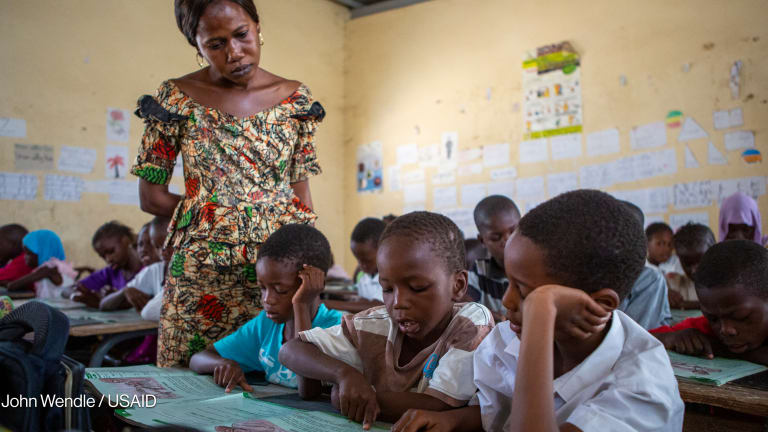
A powerful panel in the U.S. House of Representatives is expected to approve on Wednesday significant budget cuts to some of the government’s flagship development assistance initiatives, as well as allocations to U.N.-led and other multilateral programs.
The State and Foreign Operations Subcommittee draft appropriations bill released last Thursday includes striking cuts — nearly 30 percent off President Barack Obama’s budget request — to development assistance accounts, which include some of the administration’s prized poverty-reduction and international development programs that the a majority of the Republican opposition has consistently pushed to downsize.
These cuts — if implemented — would likely fall heaviest on the Feed the Future initiative for food security, as well as global climate change programming, a key foreign policy priority under Secretary of State John Kerry that the Republican majority in the House widely considers unjustified. Many observers feel the draft released last week unfairly targets poverty-reduction programs as scapegoats for a “difficult” fiscal environment.
However, even if the draft is passed by the Republican-dominated House, aid advocates expect it will likely be rejected by the Senate controlled by the Democrats, thus leading to a stalemate and continuation of the current budget scheme.
Proposed cuts
The House Appropriations Committee this year allocated 22 percent less funding to the State and Foreign Operations Subcommittee to distribute among the programs and initiatives that compose U.S. diplomatic and foreign assistance spending.
In some ways, the subcommittee’s draft appropriations bill looks like the inevitable product of across-the-board spending cuts. But reading more in between the lines, it paints a more complicated picture of a deeply-partisan interpretation of U.S. foreign assistance programs and what their worth should be.
U.S. foreign aid amounts to about 0.7 percent of the national budget; yet in their statements following the release of the appropriations bill, some members of the subcommittee argued that international poverty reduction programs are “lower priority” expenditures the government should discontinue or “put on pause.”
Among the House subcommittee’s most striking proposed cuts are contribution cutbacks to multilateral programs, especially United Nations initiatives like the Population Fund, which supports family-planning programs many in the Republican majority find objectionable.
Somewhat surprising are the depth of cuts to the Millennium Challenge Corp. — roughly 22 percent off the fiscal year 2012 allocation — a program that has traditionally garnered bipartisan support for its incentive-based and country-led approach to development assistance.
Discrepancies with Obama’s budget request
Some of the discrepancies between the president’s request and the House draft bill reflect political shifts in the months separating the two proposals. The draft appropriations bill shaves almost 55 percent from Obama’s international disaster assistance request, a reduction due mostly to a stalled administration campaign for food aid reform that sought to shift Food for Peace funding to the IDA account.
Another variation between the two proposals put forth so far that appears counterintuitive — the president’s elimination of the Democracy Fund account and the House’s subsequent full funding of it — hints at an effort to gain traction on a new funding venture, the Middle East North Africa Incentive Fund.
The so-called ”MENA IF” supports countries in the region undergoing transition and willing to demonstrate progress towards democratic reform. The administration seems to be hoping it can justify funding the initiative by zeroing out a budget line — the Democracy Fund — that it knows both chambers are likely to agree to finance anyway.
But funding programs Obama did not ask for is the exception to the rule in the House’s draft appropriations bill.
The full House Appropriations Committee meets Wednesday for the markup of the State and Foreign Operations Appropriations Bill for fiscal year 2014. The markup will allow committee members to debate and amend the House bill that funds State Department and U.S. Agency for International Development operations, among other international programs.
Cause for concern
Some in the international development community fear what may happen within the draft bill’s budget lines that have not yet been determined. They worry that as negotiations play out, both the House Republican majority and the Democratic-led Senate will fight to uphold their respective “pet issues,” while both sides neglect key development assistance and poverty-reduction programs.
House republicans typically support narcotics control, foreign military funding and security related accounts, while Senate democrats back humanitarian relief spending.
With each legislative arm propping up its signature foreign operations cause, those programs that do not fit into either category risk falling by the wayside.
The draft bill trims 29.5 percent off the president’s fiscal year 2014 budget request for the development assistance account, a difference of nearly $840 million.
This account is broken down into a number of subaccounts, each of which benefits from bipartisan support on a certain issue — biodiversity, water and microfinance — or from influential subcommittee members’ personal support — basic education for instance received full funding in the draft bill. That means what is left over (climate change, food security and newly-prioritized gender equality programs) will likely bear the burden of the overall reduction.
What to expect
While the draft bill and Wednesday’s full-committee markup offer chances to survey better the political battle lines that crisscross foreign assistance spending, it is seems unlikely the House and Senate will finalize and pass appropriations bills before the 2014 fiscal year begins on Oct. 1, thus rendering the meeting somewhat irrelevant to any real-world legislative process.
More likely, Congress will pass a continuing resolution allowing for funding to continue for government programs at current expenditure levels, until some sort of bipartisan compromise can be reached.
That outcome might be preferable for those in the development community who worry some prominent members of Congress who oppose foreign aid spending could gain even more traction as the budget debates heat up once again.
Related news:
Read more development aid news online, and subscribe to The Development Newswire to receive top international development headlines from the world’s leading donors, news sources and opinion leaders — emailed to you FREE every business day.








